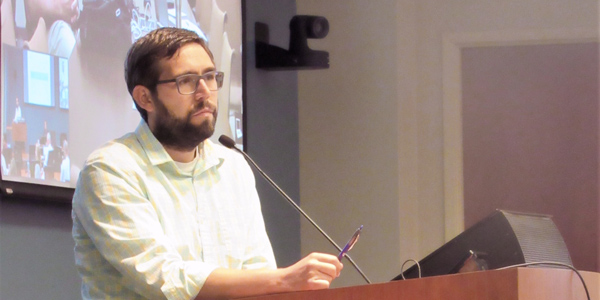By Amanda Durish Cook
CARMEL, Ind. — Behind-the-meter generation would need to demonstrate its deliverability before offering into MISO’s capacity auction, under a new proposal being floated by the RTO.
The proposal would allow “excess” behind-the-meter (BTM) generation without existing transmission service to submit to an optional engineering study identifying a deliverable megawatt volume of capacity eligible to be bid into a single planning resource auction. Any BTM generation that exceeds a utility’s planning reserve margin requirement is considered excess BTM, a term the RTO is considering adding to its Tariff.
But there’s a catch: the excess BTM generation volunteering for the study “must commit” to entering the same number of megawatts into the interconnection queue study process to offer capacity in any subsequent auction.
Going forward, excess BTM generation from new projects would have to enter the interconnection queue and commit to a deliverability study to obtain external network resource interconnection service like other MISO generators, MISO Manager of Resource Adequacy John Harmon said during a June 7 MISO Resource Adequacy Subcommittee (RASC) meeting.
Harmon said the optional study and subsequent queue commitment is intended to treat BTM generation more like traditional capacity resources that must demonstrate access to the transmission system before supplying capacity.
“We don’t want this optional study going into perpetuity. We want there to be a transition at some point. What we want is a commitment to go through those other study processes,” Harmon said. He asked for stakeholders to comment on the proposal by June 21.
MISO said it will continue to allow BTM generation to satisfy load-serving entities’ planning reserve margin requirements without a deliverability demonstration. Under MISO rules, demand response resources have first crack at reducing planning reserve margins, followed by BTM generation.
BTM generators identifying as load-modifying resources were able to demonstrate deliverability for excess capacity in the 2017/18 PRA by meeting with staff for a case-by-case review, a process MISO said it will not repeat in next year’s capacity auction. (See MISO to Take Case-by-Case Approach on BTM Generators.)
Stakeholders have in recent months urged MISO to consider alternatives for BTM generation to demonstrate deliverability other than acquiring full interconnection service or firm transmission service.
More BTM Generation Talk Upcoming
Harmon said the issue of BTM generation entering the capacity auction will be subject to further assignment decisions by the Steering Committee after a common issues meeting tentatively scheduled for July 24. The meeting was called after storage resource owners Consumers Energy, DTE Energy, Ameren, Xcel Energy and Indianapolis Power and Light submitted a joint request for MISO to create a model for the participation of storage in the market and to track its growth using the RTO’s Market Roadmap list of market revisions. (See MISO’s Next Step on Storage: ‘Common Issues’; Task Team?)
RASC Chair Chris Plante said the Steering Committee might task the RASC with defining the criteria for “lowercase” behind-the-meter generation, which represents resources not registered with or dispatchable by the RTO and not subject to market mitigation. “Uppercase” BTM refers to resources that can be dispatched. (See MISO Behind-the-Meter Generation Definitions Create Confusion.)
MISO hopes to adopt business practice manual language that clarifies the market treatment of BTM generation by this fall.
MISO to Study Extended Outage Effect on Loss of Load
Meanwhile, the RTO will continue to investigate whether extended outages should be factored into future loss-of-load-expectation studies. After an analysis of extended outages, the RTO has concluded that planned outages during peak times are “not trivial” to MISO’s planning reserve margin, said Ryan Westphal, of MISO’s Resource Adequacy Coordination department.
The issue will be further discussed in MISO’s Loss-of-Load-Expectation Working Group. MISO is also weighing whether to prohibit units on extended outages from offering into the PRA. (See MISO May Bar Units on Extended Outage from Capacity Auctions.)





